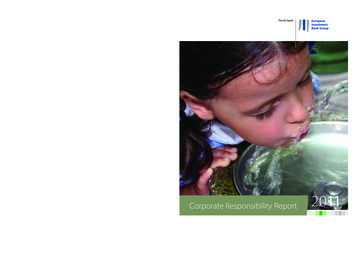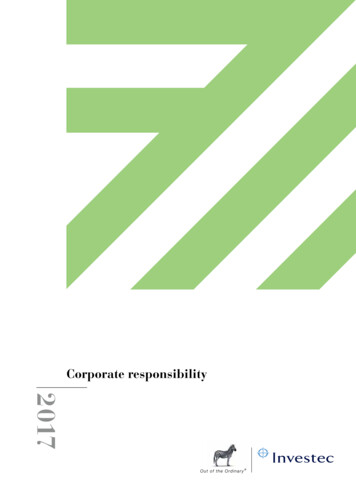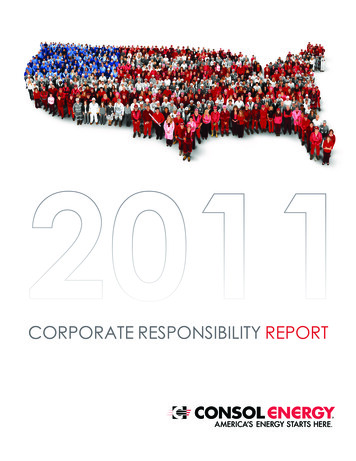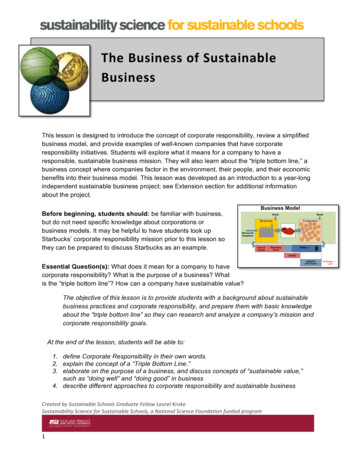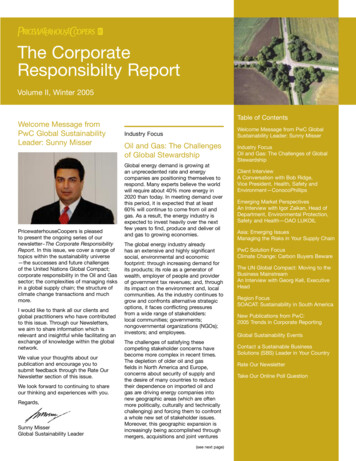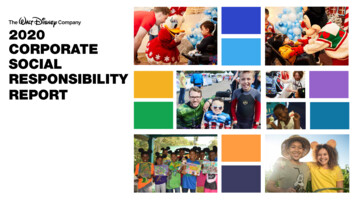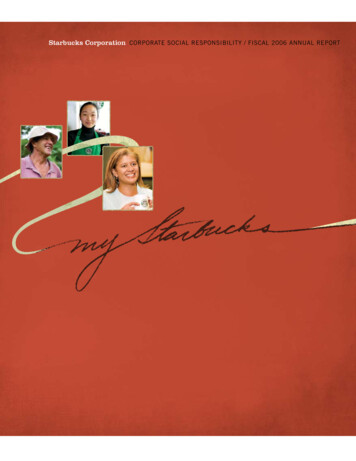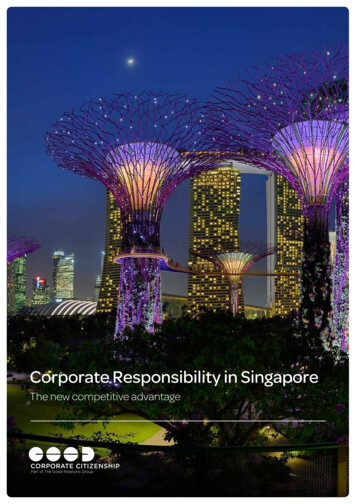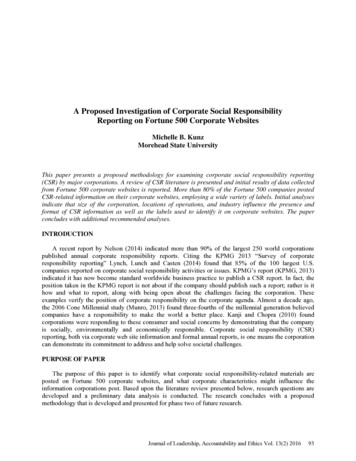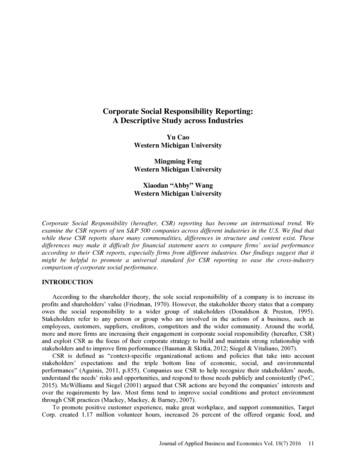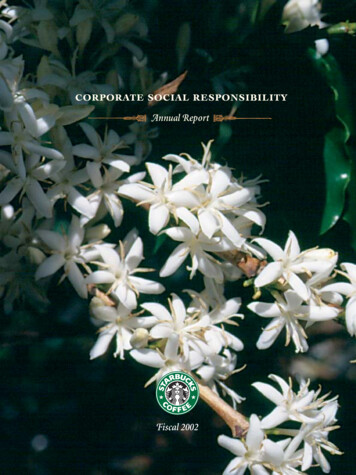
Transcription
CORPORATE SOCIAL RESPONSIBILITYAnnual ReportFiscal 2002
STARBUCKS MISSION STATEMENT AND GUIDING PRINCIPLESTo establish Starbucks as the premier purveyor of the finest coffee in the world while maintainingour uncompromising principles as we grow.The following six guiding principles will help us measure the appropriateness of our decisions: Provide a great work environment and treat each other with respect and dignity. Embrace diversity as an essential component in the way we do business. Apply the highest standards of excellence to the purchasing, roasting and fresh delivery of our coffee. Develop enthusiastically satisfied customers all of the time. Contribute positively to our communities and our environment. Recognize that profitability is essential to our future success.ABOUT THIS REPORTThe information in this report is for fiscal year2002 (October 1, 2001 through September 29, 2002)and primarily covers Starbucks company-operatedretail and distribution operations in North Americaand sourcing activities in coffee-origin countries.Information about Starbucks internationalcompany-operated and licensed retail store marketsand other select operations—Tazo Tea and HearMusic —is also included. Currency is representedin U.S. dollars throughout the report.Cover: Blossoms of an arabica coffee tree.
TABLE OF CONTENTS2Letter From Starbucks Chairman and CEO3The Business Case for Corporate Social Responsibility3COMMITMENT TO ORIGINS 45Coffee—The Importance of Sustainability6Coffee Sourcing10Investments in Coffee-Origin Countries11Tazo Tea Company—Sustainable InitiativesSTORE AND CORPORATE OPERATIONS1213Environmental Impacts of Our Operations16Purchasing Policies and Practices17Responding to StakeholdersCOMMITMENT TO PARTNERS (EMPLOYEES)1819Listening to Partners20Embracing Diversity21Starbucks Benefits Package22Partner Development and RecognitionCOMMITMENT TO COMMUNITIES2425Community Support27Other Starbucks Community Initiatives29International Initiatives30The Starbucks Foundation32Independent Verification Letter
FROM BEAN TO CUPStarbucks Approach to SustainabilityStarbucks first store, located in the heart of Seattle’s Pike Place Market, opened in 1971. As people discoveredthe great flavor of Starbucks high-quality, freshly roasted coffee beans, word quickly spread. Before long ourcoffee was legendary.What happened since still seems remarkable. Starbucks original concept of selling premium whole beancoffee was refined in 1987 when Starbucks began serving handcrafted beverages and offering a coffeeexperience, which is now embraced by more than 20 million customers worldwide every week. WhileStarbucks growth may surprise some, we no longer ask ourselves how it happened. We have built ourcompany by maintaining an unwavering commitment to Starbucks mission and guiding principles.Successful companies take measures to sustain their position. At Starbucks, we have integrated sustainablebusiness practices—which align with our mission and guiding principles—to help ensure our companycontinues to thrive. Starbucks sustainability efforts are visible throughout our supply chain, which we term“bean to cup.” This chain connects the people and places where our coffee is grown to the communitiesaround the world where our more than 6,000 stores are located.To sustain the prominence of Starbucks brand in the marketplace and build stakeholder trust, we must beaccountable for our actions. As a measure of our accountability, last year we published Starbucks firstCorporate Social Responsibility Annual Report to provide transparency on our business practices, measurements of our performance and benchmarks for future reporting. This year, we’ve taken additional steps toassure our stakeholders that the information in this report is accurate by engaging an independent third partyto verify its contents.Now we invite you to take the journey with us—from bean to cup—so you can determine for yourself howwell Starbucks is operating our business in a manner worthy of your admiration and trust. We hope theactions reflected in this report help us do that.Warm regards,Howard Schultzchairman and chief global strategistOrin C. Smithpresident and chief executive officer
CSR Fiscal 2002 Annual ReportTHE BUSINESS CASE FORCORPORATE SOCIAL RESPONSIBILITYStarbucks defines corporate social responsibility(CSR) as conducting business in ways that producesocial, environmental and economic benefits for thecommunities in which we operate. Achieving thisrequires a comprehensive set of policies, practicesand programs that are integrated throughout ourbusiness operations.According to Business for Social Responsibility, anonprofit organization dedicated to advancing leadership in responsible business practices, moreinvestors and consumers today are demanding thatcompanies be accountable for the environmental andsocial impacts of their operations. There is a growingbody of empirical studies demonstrating the positiveimpact CSR has on business economic performanceand shareholder value.We believe conducting our business responsiblydelivers benefits both to Starbucks and to our stakeholders—partners (employees), customers, suppliers, shareholders, community members andothers. We hope our actions also provide guidanceand leadership to the coffee industry as a whole.We view our CSR initiatives as long-term investments, with real benefits and rewards. Some of theinvestments Starbucks makes include: Promoting environmental conservation andincreasing economic opportunities for thepeople who produce our coffees. Minimizing our environmental impact to helpensure resources for future generations. Creating a workplace that attracts qualifiedpartners, increases retention, fosters professional growth and development, and rewardsperformance. Being a good neighbor and contributing to thequality of life in our local communities.Starbucks purchases some of the finest arabica coffeebeans grown in Latin America,Africa and Indonesia.COMPANY PROFILEFiscal 2002—October 1, 2001 toSeptember 29, 2002(Information below represents totalcompany unless noted) Total net revenues: 3.3 billion Net earnings: 215.1 million Earnings per share: 0.54 Total income taxes: 126.3 million Stock price (high/low): 25.63/ 14.56 Number of company-operated locations:3,496 (North America), 384 (International) Number of licensed locations:1,078 (North America), 928 (International) Number of partners (employees): 62,0003
The arabica coffee bean starts its journey as a cherry ona coffee tree.The harvested beans are washed and spread out to dry underthe sun.
CSR Fiscal 2002 Annual ReportCOMMITMENT TOORIGINS Coffee—The Importance of Sustainability Coffee Sourcing Investments in Coffee-Origin Countries Tazo Tea Company—Sustainable InitiativesWe begin our bean-to-cup journey with coffee farmers, the first link in Starbucks supply chain. We’ve examined manyissues that farmers face,including economic challenges and environmental concerns,which,if not addressed,could impacttheir long-term sustainability. As a result, Starbucks is taking important measures to help improve the lives of coffeefarmers and to protect the environment. Our approach is rooted in Starbucks guiding principles and translates into ourCommitment to Origins. COFFEE—THE IMPORTANCE OF SUSTAINABILITYGrown in 70 tropical countries, coffee is the second most traded commodity in the world after petroleum,with a global value of nearly 5.6 billion in 2000-2001.* By World Bank estimates, more than 25 millionsmallholder farmers make their living by producing coffee.The coffee industry comprises two distinct markets—commodity and specialty: Commodity-grade coffee, which consists of robusta and commercial quality arabica beans, is traded in ahighly competitive market as an undifferentiated product. During 2002, a global oversupply of more thantwo billion pounds (907,200,000 kilograms) of coffee drove New York “C” (the worldwide reference usedby coffee traders for commodity-grade coffee) arabica commodity prices to historic lows of 0.40-0.50 perpound ( 0.88-1.10 per kilogram). The specialty coffee market, which currently represents approximately 10%** of total worldwideunroasted (green) coffee purchases, consists primarily of high-quality arabica beans. Prices for specialtycoffee are determined by the quality and flavor of the beans and are almost always higher than theprevailing price for commodity-grade coffee.Starbucks purchases only high-quality arabica coffee, and our purchases represent about one percent of theworld’s beans. We know quality comes with a price, and as a result Starbucks pays prices that are substantiallyover and above the prevailing commodity-grade coffee price. Rather than use a New York “C”-based formulafor negotiating prices, Starbucks prefers to negotiate the majority of our contracts based on outright prices,independent of the commodity market. In fiscal 2002, Starbucks paid an average price of 1.20 per pound( 2.64 per kilogram), excluding freight, for green coffee purchased at outright prices.Coffee farming, like any other business, must be economically feasible to ensure long-term sustainability.Starbucks believes the prices we pay help farmers cover their production costs and better provide for theirfamilies. In turn, Starbucks gets assurance that the coffee farms we purchase from can meet our futuresupply needs. Although our overall purchasing impact may be relatively small, we’ve taken leadership stepsto promote environmental and social stewardship in coffee-origin countries.* International Trade Centre** Specialty Coffee Association of America5
COFFEE SOURCINGStarbucks recognizes that the continued growth and success of our business depends on a long-term supplyof quality coffee. To help ensure this supply, our coffee sourcing strategies are intended to contribute to thesustainability of coffee growers and help conserve the environment. These strategies include: Implementing Starbucks Coffee Sourcing Guidelines. Purchasing coffee at outright, negotiated prices. Building direct relationships with farms and cooperatives. Negotiating and securing long-term contracts. Making affordable credit available to coffee farmers. Purchasing Fair Trade CertifiedSM coffees. Purchasing certified organic and conservation coffees. Investing in health and educational projects that directly benefit farmers and their communities.Coffee Sourcing GuidelinesIn fiscal 2002, Starbucks introduced a set of Coffee Sourcing Guidelines to support and encourage thesustainable production of high-quality coffee as a pilot program for the 2002 and 2003 crop years. Theguidelines serve as criteria for our Preferred Supplier Program.Developed with the support of Conservation International’s Center for Environmental Leadership inBusiness, the guidelines reward farmers who meet important quality, environmental, social and economiccriteria with financial incentives and preferred supplier status. Suppliers are required to submit an applicationto the program documenting their sustainability measures. Applications must be verified by an independentthird party and are subject to audit. Starbucks has been recognized within the coffee industry and bynon-governmental organizations (NGOs) and governments around the world for pioneering such a program.COFFEE SOURCINGPercentage of Total Coffee %9%By the end of fiscal 2002, Starbucks had receivedmore than 50 applications to the program fromcoffee suppliers who are making sustainability apriority. These suppliers striving for preferredsupplier status are making ongoing investments toenhance sustainability through practices such asconserving natural resources, adding clean watertechnologies, improving social conditions andreducing or eliminating the use of agro-chemicals.In fiscal 2003, Starbucks plans to take the learningfrom the first year of the pilot phase and improve thePreferred Supplier Program through independentverification, monitoring performance and continuingto gather stakeholder feedback from growers,inspectors and external organizations.3%Fiscal 2001Fiscal 2002In last year’s report, we projected purchases for fiscal2002. This graph indicates our actual purchases forthe same period.*Amounts are not mutually exclusive by category.Purchasing at Outright PricesPurchasing coffee at negotiated, outright prices,independent of the prevailing price for commoditygrade coffee, helps provide stability and predictabilityfor buyers and sellers. Starbucks purchased themajority of our green coffee—74% in fiscal 2002—at outright prices, compared to 12% in fiscal 2001.The increase is due to a deliberate shift in the waywe purchase coffee.
CSR Fiscal 2002 Annual ReportBuilding Direct Relationships with FarmersOne of our priorities is to establish more directrelationships with farms and co-ops we know andtrust. Purchasing directly from farms, with the assistance of a third-party facilitator, delivers more of thepurchase price to the farmers. Through direct relationships, Starbucks gains a greater degree oftransparency on how much farmers receive. Ourlong-term goal is to improve transparency for ournon-direct purchases as well. In fiscal 2002, 32% ofour total green coffee supply was purchased throughdirect relationships at negotiated prices, comparedto 9% in fiscal 2001.Signing Long-Term ContractsGiven the current economic climate, farmers prefer to know they have buyers for future harvests. Bysigning long-term contracts with farmers, Starbucksis able to purchase our future coffee supply atpredictable prices over multiple crop years. Weincreased our purchases of coffee negotiated throughlong-term contracts, which average three to fiveyears, from 3% of our total supply in fiscal 2001 to36% in fiscal 2002.Access to CreditSmallholder coffee farmers frequently experience ashortage of cash long before the next harvest. Due toa chronic lack of working capital, they often selltheir crops to local buyers who use the scarcity ofcredit and the region’s geographical isolation tosecure coffee from producers at low prices. To helpbreak this cycle, Starbucks has instituted severalinitiatives to provide farmers access to affordable credit.7RECOGNITION OF OUR EFFORTS In May 2002, Starbucks was honored with thefirst annual Humanitarian Award by the CoffeeQuality Institute, a nonprofit education foundation and separate fund of the Specialty CoffeeAssociation of America.The award recognizes ourcontributions to the quality of life for farmers andtheir families, leadership in protecting the qualityof the environment in coffee agriculture, and ourcommitment to continued improvement of coffeequality in origin countries. Starbucks was named one of the 100 Best Corporate Citizens in the March/April 2002 issue ofBusiness Ethics magazine.The ranking is basedon quantitative measures of corporate service toseven stakeholder groups: shareholders, employees,customers, the community, the environment, overseas stakeholders, and women and minorities. Starbucks was included in the 2002-2003 DowJones Sustainability Index (DJSI), the secondconsecutive year the company has been on the list.This assessment of the 2,500 largest companies inthe DJSI focuses on economic, environmental andsocial performance. Starbucks was one of 300companies from 23 countries that led theirindustry in sustainability. In recognition of our collaboration withConservation International (CI) to encouragesustainable coffee farming practices, Starbucksand CI were recipients of a 2002 World SummitBusiness Award for Sustainable DevelopmentPartnerships in Johannesburg, South Africa, inAugust 2002.In fiscal 2002, Starbucks, through a loan guarantee, helped make 500,000 available through EcologicEnterprise Ventures (EEV), a nonprofit organization providing affordable crop financing to smallholdercoffee farmers in Latin America, and Conservation International (CI). This was the second year thatStarbucks assisted Mexican coffee farmers with pre- and post-harvest loans through a loan guarantee.According to CI, the results of this program in fiscal 2002 were: 205 farmers received pre-harvest financing, an increase of 25% over last year. 691 farmers received post-harvest financing, an increase of 96% over last year. 1.25 million pounds (566,990 kilograms) of coffee were financed, an increase of 57% over last year.Fair Trade CertifiedSM CoffeeIn the Fair Trade certification system, smallholder coffee farmers who are organized into democratically runorganizations and registered with the Fairtrade Labelling Organizations International (FLO) can sell theirbeans directly to importers, roasters and retailers at favorable guaranteed prices. To purchase Fair TradeCertifiedSM coffee, a buyer must pay a minimum of 1.26 per pound ( 2.77 per kilogram) for non-organicgreen arabica coffee and 1.41 per pound ( 3.10 per kilogram) for organic green arabica coffee. According toTransFair USA, an independent nonprofit organization that licenses Starbucks to sell Fair Trade coffeeimported into the U.S., the guaranteed prices help increase earnings for farmers, enabling them to afford basichealth care, education and home improvements.
FAIR TRADE, ORGANIC AND CONSERVATION (SHADE GROWN) COFFEE PURCHASESFiscal 2000Fiscal 2002Pounds (kilograms) ofCoffee Purchased1.7 million 1.8 million1.1 0)Totals:Fiscal 84,000(310,000)304,000(138,000)646,000 lbs (293,000 kg)*1.8 million lbs (816,000 kg)*3.4 million lbs (1.5 million kg)*Fair Trade CertifiedSM CoffeeCertified Organic Coffee (includes Organic Fair Trade and Organic Conservation [Shade Grown] Coffee)Conservation (Shade Grown) Coffee*Coffees may be certified in more than one category.Since forming an alliance with TransFair USA in April 2000, Starbucks has become one of North America’slargest roasters and retailers of Fair Trade CertifiedSM coffee. In fiscal 2002, Starbucks purchased 1.1 millionpounds (498,952 kilograms) of Fair Trade CertifiedSM coffee. Starbucks Fair Trade Blend is sold in all of ourU.S. company-operated stores and in some international markets.Starbucks sold a total of 530,000 pounds (240,404 kilograms) of Fair Trade CertifiedSM coffee through ourretail stores and Business Alliances accounts in fiscal 2002. Business Alliances accounts include collegesand universities, hotels and other locations licensed to sell Starbucks coffee. In fiscal 2002, Starbucks soldFair Trade CertifiedSM coffee through 332 of our Business Alliances accounts, which included 188 collegesand universities.In fiscal 2002, Starbucks signed a Memorandum of Understanding with Fairtrade Labelling OrganizationsInternational, enabling us to offer Fair Trade CertifiedSM coffee in our international markets. At the end offiscal 2002, Starbucks was licensed to sell Fair Trade CertifiedSM coffee in Austria, Canada, Germany, Japan,Switzerland, the U.K. and the U.S.Working with Fair Trade FarmersIn July 2002, Starbucks, the Ford Foundation and Oxfam America announced a pilot project in collaboration with CEPCO, a large Fair Trade coffee cooperative in Oaxaca, Mexico, with more than 16,000farmers. The goals of the project are to increase the supply of high-quality Fair Trade CertifiedSM coffee andenable participating farmers to earn premium prices for their crops.Starbucks and the Ford Foundation, a philanthropic organization that works to reduce poverty and promoteinternational cooperation, each contributed 125,000 for the first year of the pilot project. Oxfam America,an organization dedicated to creating solutions to hunger, poverty and social injustice around the world, willwork directly with farmers of the CEPCO cooperative on improvements to their post-harvest quality controltechniques. By providing farmers with the tools to improve their skills, and thus the quality of their coffee,we hope to increase their opportunities for self-sufficiency and sustainability.
CSR Fiscal 2002 Annual ReportOrganic CoffeeOrganic coffee is grown without the use of synthetic pesticides, herbicides or chemical fertilizers. Thesegrowing practices help maintain a healthy environment and clean ground water. Once harvested, the coffeebeans must be processed in organically certified mills and roasting facilities to be sold as certified organic.Many of the coffees Starbucks buys are grown using organic methods but are not certified as such. Officialcertification requires farms to submit to three years of soil testing, and annual testing thereafter, to verify they areusing accepted organic farming practices. Starbucks has offered certified organic coffee since 2000. In fiscal 2002,Starbucks purchased 1.7 million pounds (771,107 kilograms) of certified organic coffee and introduced SerenaOrganic Blend, an exclusive certified organic coffee available in our company-operated stores in North America.Conservation (Shade Grown) CoffeeSince 1998, Starbucks has partnered with Conservation International (CI), a nonprofit conservationorganization, to promote sustainability in coffee-origin countries. Through CI’s Conservation Coffee program,Starbucks is encouraging the production of coffee using traditional cultivation methods that protectbiodiversity and provide improved economic opportunities for coffee farmers.Starbucks Shade Grown Mexico coffee, purchasedthrough CI’s Conservation Coffee program, comesexclusively from farms surrounding the El TriunfoBiosphere Reserve in Chiapas, Mexico, one of theworld’s most important biodiversity hotspots.In fiscal 2002, Starbucks invested 200,000 to support this project as part of a three-year commitmentto provide a minimum of 600,000. The results ofthis program, according to CI, in fiscal 2002 include: Farmers supplying Shade Grown Mexicoreceived an 87% price premium over local pricesfor their coffee. Exports of coffee from the ChiapasConservation Coffee program increased 110%over fiscal 2001. More than 1,000 farmers participated in theprogram, up from 691 the year before. The milling yield for coffee (green coffee beansresulting from processing raw coffee) increased from64% to 76%. More than 7,400 acres (2,995 hectares) of coffeefields in Chiapas are currently being managedusing best practices for conservation coffee.In fiscal 2002, Starbucks purchased 1.8 million pounds(816,466 kilograms) of conservation coffee to meetincreased consumer demand and ensure year-roundavailability, and added Decaf Shade Grown Mexico toour lineup of conservation coffees.Starbucks and CI have begun developing similarconservation projects in Colombia and Peru. Futureplans are to expand the program in other areaswhere biodiversity is under severe threat, includingPanama and Costa Rica.SUPPORTING CONSERVATION ANDCOFFEE FARMERSLocated only a few kilometers from the core zoneof the El Triunfo Biosphere Reserve in Chiapas,Mexico, Jose Julio Perez Lopez is a secondgeneration, smallholder coffee farmer cultivatingsome of the highest quality shade grown arabicacoffee. His farm is nestled on a mountainsidenear the community of Nueva Colombia, whereconservation coffee production has become vitalto the health of the Reserve’s ecosystem and tothe economy of the local community.Jose Julio produces organic coffee grown undera natural canopy of shade trees interspersedwith fruit trees and other crops that help feedhis family.As a member of the farmer cooperative CESMACH, Jose Julio has received technicalassistance and training in organic coffee production and processing through CI’s ConservationCoffee program.The investment by CI,Starbucks and his cooperative helps Jose Julioearn a premium for his high-quality coffee andencourages natural resource conservation.9
INVESTMENTS IN COFFEE-ORIGIN COUNTRIESAs part of our ongoing commitment to the people and places where Starbucks coffee is grown, we’veestablished partnerships with international nonprofit organizations that share our concerns. We also supportcommunity projects to improve the well-being of families in coffee-farming regions.CAREOur 11-year alliance with CARE, an international organization dedicated to fighting global poverty in morethan 60 countries, has given us the opportunity to touch the lives of nearly three million people in coffeeorigin countries. Over the years, Starbucks has contributed or helped raise more than 2 million for CAREprograms, making Starbucks one of CARE’s largest North American corporate donors.In fiscal 2002, Starbucks worked with CARE to establish the Starbucks Emergency Response Fund to enableus to respond to natural disasters and crises in countries where Starbucks sources coffee and tea. In 2002,Starbucks donated 200,000 to this fund.Social Development ProjectsOver the years, some of the relationships Starbuckshas built with farmers have produced far morethan coffee. Starbucks and a number of farmshave collaborated to improve local watersystems, construct coffee mills and support manyother projects that benefit farming families andtheir communities.Starbucks helped fund several education and healthrelated projects at Finca Dos Marias, a coffee farm inGuatemala, including this school that provides daycare through middle school classes for children livingon the farm.The projects are funded in two ways. First, Starbuckspays an additional premium on top of the purchaseprice for coffee from a specific farm. The addedpremiums go toward the project. In turn, thefarm matches Starbucks contribution so they havea vested interest in the project. Many of theseinitiatives are ongoing to ensure that once theprojects are developed, they are sustained.In fiscal 2002, Starbucks contributed more than 85,000 in premiums for these social development projects.While there are many examples we could provide, here are two that highlight our collaborative efforts: In Nicaragua, we helped build lavatory facilities and improve water quality at the Modesto ArmijoSchool, which is attended by 1,200 elementary schoolchildren from San Juan de Rio Coco. Starbucks and five Guatemalan coffee farms built and are maintaining health clinics, day care centers andschools that serve 5,000 people in local farming communities.Coffee Kids In fiscal 2002, Starbucks also contributed 25,000 to Coffee Kids, a nonprofit organization dedicated toimproving the quality of life for children and families who live in coffee-growing communities. Thesefunds financed local micro-credit projects in Mexico and Nicaragua, serving more than 2,200 women andtheir families.
CSR Fiscal 2002 Annual ReportTAZO TEA COMPANY—SUSTAINABLE INITIATIVESORGANIC TEA INGREDIENTS PURCHASEDFiscal 2001Fiscal 200280%Percentage byVolume70%60%50%56.750.2TEA SOURCING PRACTICESTazo Tea Company, a wholly owned subsidiaryof Starbucks, is committed to supportingsustainable farming practices and purchasingcertified organic tea whenever it is availablein sufficient quantities that meet Tazo’srigorous quality standards.In addition to tea,Tazo uses a wide varietyof botanicals and spices in many of itsproducts and is actively sourcing organicsupplies of these materials.Tazo alsocontracts with companies that engage incommunity development projects.40%30%20%10%0%In Starbucks fiscal 2001 Corporate SocialResponsibility Annual Report, we reported thepercentage of black and green organic teapurchased.Tea leaves are only one ingredient ofthe raw materials we purchase for Tazo teas,so to better reflect Tazo’s organic purchases, wechanged the metric this year to include the totalamount of organic raw materials purchased forTazo teas, including botanicals and spices.(See graph at left.)Tazo Tea Company and Mercy CorpsIn September 2002, Tazo and Mercy Corps, a reliefagency that operates health and economic developmentprograms in more than 30 countries, formed a partnership to support tea communities. The project will bebased in the tea-growing region of Darjeeling, India,where Tazo purchases some of the world’s finest teas.The project will focus on three key areas: improving thequality of and access to water; supporting regionalsocial, environmental and economic programs; anddeveloping young people’s leadership skills andopportunities for their future. Starbucks, Tazo and itsbusiness partners will invest 600,000 to fund thisthree-year program.Sumitra Tamang plucks tea in the Paila Khetisection of Makaibari Tea Estates, a biodynamicgarden in Darjeeling, India, where some ofTazo’s teas are grown.11
After green coffee arrives at Starbucks, it is roasted to bringout a full range of flavors.While the world’s finest beans are an essential ingredient,it also takes the skilled hands of a barista to create aStarbucks beverage.
CSR Fiscal 2002 Annual ReportSTORE AND CORPORATEOPERATIONS Environmental Impacts of Our Operations Purchasing Policies and Practices Responding to StakeholdersIn this section, our bean-to-cup journey highlights sustainable measures Starbucks has taken to minimize theenvironmental impact of our operations, select suppliers who share our values, and respond to stakeholder concerns.In many of these areas, we’ve established metrics to measure Starbucks performance and provide the feedback neededto make future improvements.We firmly believe the way we operate our business is not only fundamental to our success,but defines the type of company Starbucks strives to be.ENVIRONMENTAL IMPACTS OF OUR OPERATIONSStarbucks approach to improving our environmental performance is guided by our environmental missionstatement, which we adopted in 1992. (See sidebar below.)To bring this mission statement to life, Starbucks develops policies and procedures that are implementedthroughout our stores, roasting plants and support centers. Starbucks examines the success of our currentmeasures and seeks new opportunities for improvement.Measuring a
CORPORATE SOCIAL RESPONSIBILITY Starbucks defines corporate social responsibility (CSR) as conducting business in ways that produce social, environmental and economic benefits for the communities in which we operate. Achieving this requires a comprehensive set of policies, practices and
